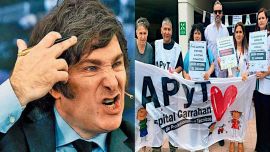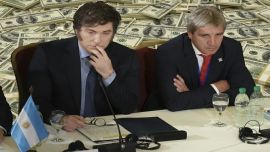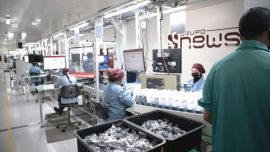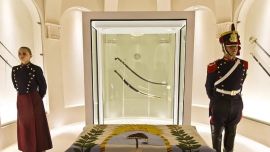Luiz Inácio Lula da Silva’s call for South American unity fell flat this week as the Brazilian president’s warm welcome for Venezuelan leader Nicolás Maduro overshadowed his regional "retreat" for heads of state.
Veteran leftist Lula, who returned to office in January after leading Brazil from 2003 to 2010, is looking to strengthen diplomatic ties in a region where left-wing governments are newly back in style.
But he faced criticism for his hosting of Maduro, a pariah in some quarters for his government's alleged human-rights violations and crackdown on political dissent – a depiction Lula questioned Monday as a hostile "narrative."
The disagreement came to light as presidents from 11 countries and the head of Peru’s council of ministers convened in the first major meeting of South American leaders since 2014.
Fissures exposed
The Venezuela issue exposed fissures at what was meant to be a display of South American diplomatic goodwill and cooperation.
"I was surprised to hear what's happening in Venezuela described as a 'narrative,'" said Uruguay's centre-right President Luis Lacalle Pou, who has labelled Maduro a "dictator."
“If there are so many groups in the world that are trying to mediate so that there’s full democracy in Venezuela, that human rights are respected and there aren’t any political prisoners, the worst thing that we could do is bury our head in the sand,” he told the summit.
"Human rights must be respected everywhere, always, no matter the political colours of the leader in power," agreed Chile's left-wing President Gabriel Boric.
“It’s a reality. It’s serious, and I have had the opportunity to see it in the eyes and the pain of hundreds of thousands of Venezuelans who are in our country today and who demand a firm, clear position regarding human rights,” he said.
However, the Chilean did back the Venezuelan government's call for Washington and the European Union to lift sanctions on Maduro and his inner circle.
Different visions
Maduro responded by saying Chile and Uruguay "have one vision" and Venezuela, "another."
"The most important thing is that there has been a debate," he said, announcing "a new stage" of South American integration.
Argentina’s President Alberto Fernández was also among those to meet individually with Maduro, a move that prompted opposition criticism of the Peronist leader.
During the talks, Fernández called for an end to international sanctions against Venezuela and said a “political solution” to the situation facing the country could not be “subject to external pressures or conditions.”
Lula firmly defended Maduro, whose country he said was experiencing a period of "tranquillity."
"The same demands that the democratic world makes for Venezuela it does not make for Saudi Arabia," Lula said at the press conference.
He had warmly welcomed Maduro to Brasília Monday, reversing the policy of his far-right predecessor, Jair Bolsonaro (2019-2022), who had cut ties with Venezuela's socialist government and joined the US-led Lima Group of more than 50 countries in recognising opposition leader Juan Guaidó instead.
Lula, who greeted Maduro with a hug, hailed it as a "new moment" in the countries' relations.
"Compañero Maduro, you know the narrative that was built against Venezuela: that of anti-democracy, of authoritarianism. It is up to Venezuela to show its [own] narrative, so that people can change their minds," Lula said controversially at a press conference confirming a “full” restoration of diplomatic ties between the two nations.
'New pink tide'
Eleven of South America's 12 heads of state attended the Brasilia summit, the first of its kind in nearly a decade, which Lula said turned the page on an era of divisions. The only absence was Peruvian President Dina Boluarte.
"We let ideology divide us and interrupt our efforts to integrate. We abandoned our channels of dialogue and our mechanisms of cooperation, and we all lost because of it," Lula said in his opening remarks.
The 77-year-old took a jab at Bolsonaro, saying his predecessor – who closely allied himself with US ex-president Donald Trump – had "closed our doors to historic partners."
This is the first summit of regional leaders since 2014 in Ecuador, at a gathering of UNASUR, a continental bloc launched in 2008 by Lula and Maduro's mentor, late Venezuelan president Hugo Chávez. That was the moment of Latin America's so-called "pink tide" of left-wing governments in the region.
Now, some political analysts are talking of a "new pink tide" with the elections of Lula, Boric and Colombia's Gustavo Petro.
Lula wants to get the region cooperating again. His government has touted projects such as a "Bi-Oceanic Corridor," a transportation artery to enable countries to ship goods across the continent overland instead of by sea.
The summit was a small, "more relaxed" gathering, with only the leaders, their foreign ministers and select advisers in the room, a Brazilian diplomatic source said.
The leaders attended a summit in the morning, then held an informal discussion session before Lula hosted them for dinner at his official residence, the Alvorada Palace.
Regional reset?
"Groundbreaking visions" for South America's future are unlikely to emerge from the summit, said international relations specialist Oliver Stuenkel.
But "even a basic dialogue between heads of state is genuine progress after Brazil largely retreated from its neighbourhood during the Bolsonaro years," he wrote in Americas Quarterly.
After Lula defeated Bolsonaro in a divisive election, he has been overhauling Brazil's foreign policy, vowing to seek friendly relations across the board and cultivating closer ties with partners as disparate as Beijing and US President Joe Biden's administration.
He has also raised eyebrows at times in the West for comments such as his criticism of the United States and Europe for helping Ukraine fight off Russia's invasion.
But he has drawn accusations from opponents of being overly cosy with Russia, China and Latin American leftists such as Maduro and Nicaragua's Daniel Ortega, also accused of human rights violations.
Some questioned the likelihood of a new era of South American unity. The continent "is united in rhetoric, but not on concrete projects," said Colombia's Petro.
– TIMES/AFP/BLOOMBERG



















Comments